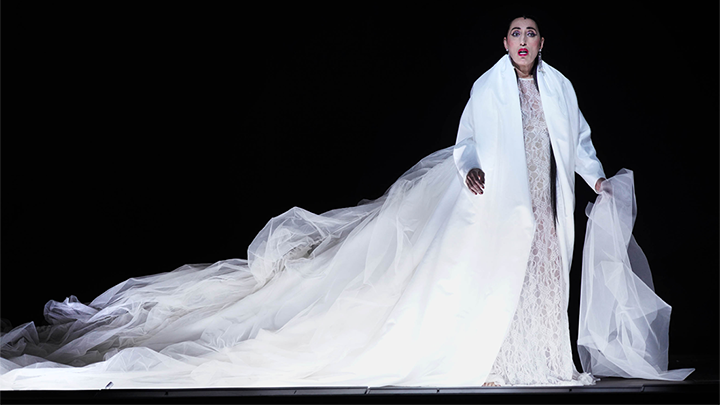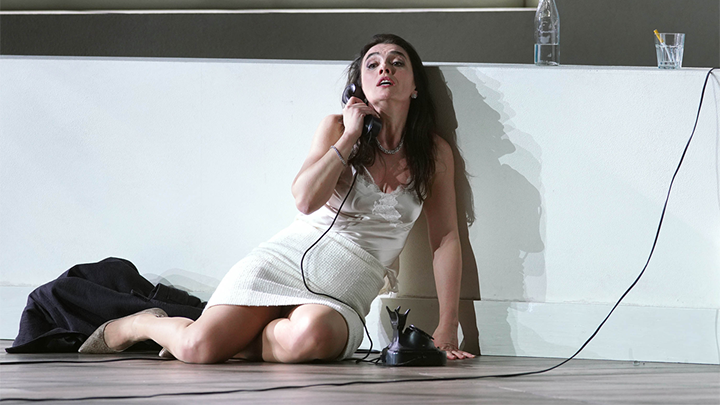
It’s a drag show all but in name: she sings Ornella Vanoni in a smoky contralto, recites the final scene of Wilde’s Salomé in French, translates Brecht into Spanish, and does a stand-up comedy routine, regaling the audience with the story of her childhood boyfriend.
This is Silencio, a halftime show of sorts between Poulenc’s La Voix Humaine and Schoenberg’s Erwartung. Both monodramas are heavy pieces, and Rossy de Palma lends humor, surrealism, and a healthy dose of camp to what could otherwise be a gloomy evening. I’m still not sure how Silencio relates to the other works beyond loosely covering the themes of love and obsession, but it doesn’t detract either and Rossy de Palma is certainly a big audience draw.
Director Christof Loy presents the Poulenc and Schoenberg as a breakup in reverse. Voix Humaine is set in a bright studio loft, empty apart from a chair and telephone. We’re worlds away from Almodóvar’s glossy technicolor world, though the director was spotted in the audience on opening night – instead, Loy drains his stage of nearly all color in a clean but clinical bourgeois setting. Marthe (Rossy de Palma once again) moves boxes and garbage bags out of the loft as Ermonela Jaho’s Elle paces the empty space with her rotary telephone. I’m not sure whether Marthe’s presence adds or detracts; it’s difficult to imagine why she would leave Elle alone with a bottle of pills after watching her have a half-hour breakdown, and her presence makes it less apparent the extent to which Elle is lying.
This is, perhaps, Loy’s greatest insight into the drama – while most productions start with Elle mid-breakdown, Loy has his heroine start in full composure. Jaho, elegant and business-like in her heels and black coat, mercifully doesn’t indulge in the self-pitying cooing that many singers adopt. It’s all the more shocking, then, to watch her unravel, screaming into the telephone while swallowing pill after pill.
Nobody does breakdowns quite like Jaho, who marries utter dramatic conviction with a riveting vocal fearlessness. But while the climaxes of Butterfly and Suor Angelica can find her pressed to her vocal limits, Poulenc is much better suited to her slender, occasionally piercing lyric soprano. The high C is glorious, dragged out until it fills the auditorium, and elsewhere she brings a wealth of color and nuance to her sound. It may be the best role I’ve heard her do.
The Schoenberg uses the same set, now full of furniture and with flowers blooming outside the windows. Malin Byström paces around the apartment in a robe in the aftermath of a dinner party, after having a fight with her lover. She imagines finding his bloody corpse, approaching him with a knife as he reappears alive and well in the final bars. Is this meant to be Poulenc’s Elle, the night before? Loy never makes the connection between the two operas clear, but there’s plenty for the audience to think about.
The more extrovert production suits Schoenberg’s graphic symbolism well, and Byström handles the score’s rangy demands beautifully. Her soprano is rich and middle-heavy, though her upper register has a silvery sheen that explains why she is so sought after as a Straussian. She sings Schoenberg in that idiom, emphasizing the soaring, flexible long lines of the score rather than its dissonances. It’s certainly the most beautiful Erwartung you’ll hear, even if Byström offers less in the way of text and drama than many of her predecessors in the role.
Conductor Jérémie Rhoher and the Teatro Real orchestra bring color, virtuosity, and momentum to both scores, even if Rhoher risks swamping his sopranos at times. No such problems, of course, with Rossy de Palma, who sings her way offstage accompanied by nothing more than an accordion.
Photos: Javier del Real



























Comments